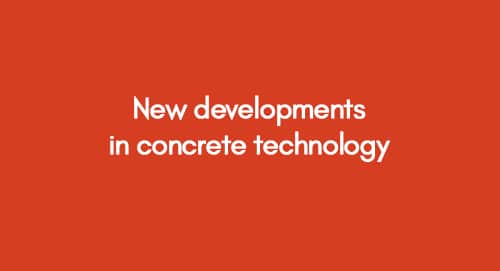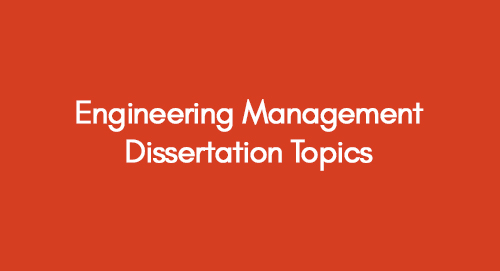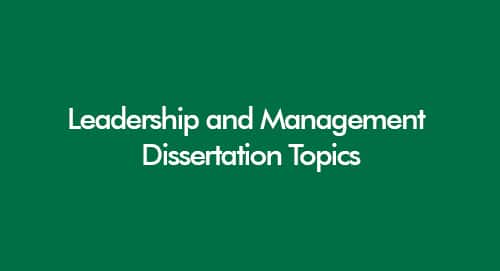
List of 148+ COVID-19 Dissertation Topics in 2025
January 19, 2021
New Developments in Concrete Technology
January 27, 2021Engineering management simply refers to the management of all engineering aspects. It combines technology and organization to optimise engineering and overcome its limitations. Research in this field is crucial for improving engineering's potential. Thus, researchers and students must look for quality engineering management dissertation topics.
Engineering Dissertation Topics
Premier Dissertations has prepared a list of dissertation topics in engineering management for 2025.
Construction Engineering Dissertation Topics | Project Management Dissertation Topics
List of New Engineering Management Dissertation Topics 2025
Research-Based Engineering Management Thesis Topics
Trending Engineering Management Research Topics 2025
Prime Engineering Management Dissertation Topics
Engineering Management Dissertation Topics for Undergraduate Students
Topic 44. Examining the Role of Project Scheduling Software in Enhancing Efficiency in Engineering Projects: A Quantitative Study
Topic 45. Evaluating the Impact of Agile Methodologies on Engineering Project Management in the Automotive Sector
Topic 46. Analysing the Effectiveness of Risk Management Practices in Large-Scale Construction Projects: A Case Study
Topic 47. Understanding the Role of Lean Manufacturing Techniques in Reducing Waste in Engineering Operations
Topic 48. Assessing the Impact of Big Data Analytics on Decision-Making in Engineering Management: A Systematic Study
Topic 49. Exploring the Influence of Cultural Diversity on Team Collaboration in Engineering Management: A Qualitative Study
Topic 50. Examining the Role of Sustainability Practices in Engineering Project Management: A Case Study
Topic 51. Evaluating the Benefits of Integrated Design and Delivery Solutions in Engineering Projects
Topic 52. Analysing the Impact of Artificial Intelligence on Resource Allocation in Engineering Management
Topic 53. Understanding the Challenges of Implementing Industry 4.0 in Engineering Enterprises: A Qualitative Study
Topic 54. Assessing the Effectiveness of Knowledge Management Systems in Enhancing Engineering Innovation
Topic 55. Exploring the Role of Blockchain Technology in Supply Chain Management for Engineering Projects
Topic 56. Examining the Impact of Remote Working Trends on Engineering Project Coordination: A Case Study
Topic 57. Evaluating the Effectiveness of Six Sigma Methodologies in Improving Engineering Processes
Topic 58. Analysing the Role of Digital Twin Technology in Optimising Engineering Project Outcomes
Topic 59. Understanding the Contribution of Cloud-Based Tools in Engineering Data Management
Topic 60. Assessing the Influence of Leadership Styles on Engineering Team Performance
Topic 61. Exploring the Role of Ergonomics in Enhancing Worker Productivity in Engineering Workshops
Topic 62. Examining the Impact of Vendor Management Strategies on the Success of Engineering Projects
Topic 63. Evaluating the Challenges of Implementing Circular Economy Principles in Engineering Management
Topic 64. Analysing the Effect of Real-Time Monitoring Systems on Engineering Quality Assurance
Topic 65. Understanding the Importance of Ethical Decision-Making in Engineering Management Practices
Topic 66. Assessing the Role of Virtual Reality in Engineering Training and Development
Topic 67. Exploring the Use of Additive Manufacturing in Engineering Product Lifecycle Management
Topic 68. Examining the Effectiveness of Cross-Functional Teams in Engineering Project Success
Topic 69. Evaluating the Impact of Resource Scarcity on Engineering Management Strategies
Topic 70. Analysing the Role of Green Engineering Practices in Achieving Sustainable Development Goals
Topic 71. Understanding the Challenges of Managing Multinational Engineering Teams
Topic 72. Assessing the Benefits of Digital Collaboration Platforms in Engineering Management
Topic 73. Exploring the Impact of Standardisation on International Engineering Projects
Topic 74. Examining the Role of Cybersecurity Measures in Protecting Engineering Systems
Topic 75. Evaluating the Importance of Continuous Improvement Practices in Engineering Management
Topic 76. Analysing the Effectiveness of Hybrid Project Management Approaches in Engineering
Topic 77. Understanding the Influence of Policy Changes on the Engineering Sector: A Case Study
Topic 78. Assessing the Impact of Environmental Regulations on Engineering Design Processes
Topic 79. Exploring the Role of Workforce Upskilling in Enhancing Engineering Competitiveness
Topic 80. Examining the Application of IoT in Smart Manufacturing Engineering: A Case Study
Engineering Management Dissertation Topics for Mater Students
Topic 81. Analysing the Role of Digital Transformation in Engineering Management: A Case Study of UK Construction Firms
Topic 82. Assessing the Impact of Automation Technologies on Productivity in the Engineering Sector: A Quantitative Study
Topic 83. Examining the Challenges of Implementing Sustainability Practices in Engineering Project Management
Topic 84. Evaluating the Effectiveness of Engineering Risk Mitigation Strategies in Renewable Energy Projects
Topic 85. Understanding the Contribution of Smart Supply Chains in Enhancing Efficiency in Engineering Projects
Topic 86. Exploring the Role of Digital Twin Technology in Engineering Asset Management
Topic 87. Assessing the Impact of Leadership Skills on Engineering Project Success: A Systematic Study
Topic 88. Analysing the Importance of Knowledge Sharing in Multinational Engineering Teams: A Qualitative Study
Topic 89. Evaluating the Influence of Artificial Intelligence on Quality Assurance in the Engineering Sector
Topic 90. Examining the Effectiveness of Resource Optimisation Techniques in Engineering Management
Topic 91. Exploring the Role of Blockchain in Securing Data in Engineering Project Management
Topic 92. Assessing the Impact of Environmental Sustainability Policies on Engineering Operations: A Case Study of the European Union
Topic 93. Analysing the Relationship Between Agile Practices and Innovation in Engineering Management
Topic 94. Evaluating the Importance of Stakeholder Engagement in Large-Scale Engineering Projects
Topic 95. Examining the Role of Cloud Computing in Enhancing Collaboration in Engineering Teams
Topic 96. Understanding the Challenges of Adopting Circular Economy Principles in Engineering Design
Topic 97. Assessing the Impact of Machine Learning on Predictive Maintenance in Engineering Systems
Topic 98. Exploring the Effectiveness of Employee Training Programs in Improving Engineering Project Outcomes
Topic 99. Analysing the Impact of Cultural Differences on Engineering Project Collaboration: A Qualitative Study
Topic 100. Evaluating the Role of Digital Communication Tools in Engineering Management
Topic 101. Examining the Impact of Supply Chain Disruptions on Engineering Projects During Global Crises
Topic 102. Understanding the Role of Ergonomics in Enhancing Worker Safety in Engineering Industries
Topic 103. Assessing the Impact of Leadership Styles on Employee Motivation in the Engineering Sector
Topic 104. Exploring the Role of Smart Sensors in Monitoring Engineering Systems for Optimal Performance
Topic 105. Analysing the Effectiveness of Process Standardisation in International Engineering Projects
Topic 106. Evaluating the Challenges of Data Integration in Engineering Management Systems
Topic 107. Examining the Role of Advanced Manufacturing Technologies in Engineering Innovation
Topic 108. Understanding the Impact of Cybersecurity Threats on Engineering Operations
Topic 109. Assessing the Contribution of Virtual Reality to Training in the Engineering Sector
Topic 110. Exploring the Role of Sustainable Energy Solutions in Engineering Management
Topic 111. Analysing the Relationship Between Engineering Ethics and Sustainable Practices: A Systematic Study
Topic 112. Evaluating the Effectiveness of Remote Team Management Strategies in the Engineering Sector
Topic 113. Examining the Role of Internet of Things (IoT) in Revolutionising Engineering Systems
Topic 114. Understanding the Impact of Public-Private Partnerships on Large-Scale Engineering Projects
Topic 115. Assessing the Importance of Interdisciplinary Collaboration in Engineering Innovations
Topic 116. Exploring the Use of Digital Prototyping in Reducing Costs in Engineering Design
Topic 117. Analysing the Role of Employee Engagement in Engineering Organisational Success
Topic 118. Evaluating the Challenges of Managing Global Supply Chains in Engineering
Topic 119. Examining the Impact of Artificial Intelligence on Engineering Process Optimisation
Topic 120. Understanding the Role of Virtual Design in Enhancing Engineering Product Development
Engineering Management Dissertation Topics for PhD Students
Topic 121. Analysing the Impact of Artificial Intelligence on Predictive Maintenance in Large-Scale Engineering Projects: A PhD-Level Study
Topic 122. Evaluating the Role of Systems Thinking in Engineering Risk Management: A Case Study of the Aerospace Industry
Topic 123. Examining the Integration of Blockchain Technology in Supply Chain Management for Engineering Projects
Topic 124. Assessing the Impact of Sustainable Engineering Practices on Project Performance Metrics
Topic 125. Understanding the Role of Big Data Analytics in Engineering Decision-Making Processes
Topic 126. Analysing the Influence of Cross-Cultural Collaboration on Global Engineering Project Outcomes
Topic 127. Evaluating the Use of Internet of Things (IoT) Devices in Optimising Engineering Operations
Topic 128. Examining the Challenges of Managing Knowledge Transfer in Engineering Firms: A Systematic Study
Topic 129. Exploring the Role of Digital Twin Technology in Improving Engineering Asset Lifecycle Management
Topic 130. Assessing the Effectiveness of Lean Engineering Practices in Reducing Project Delays
Topic 131. Analysing the Contribution of Agile Methodologies to Innovation in Engineering Projects
Topic 132. Evaluating the Impacts of Leadership Styles on Engineering Team Performance
Topic 133. Examining the Role of Renewable Energy Integration in Engineering Management Strategies
Topic 134. Understanding the Challenges of Adopting Circular Economy Principles in Engineering Practices
Topic 135. Assessing the Role of Virtual and Augmented Reality in Engineering Training Programmes
Topic 136. Exploring the Effects of Cybersecurity Threats on Engineering Data Management
Topic 137. Analysing the Role of Cloud Computing in Facilitating Collaboration Among Engineering Teams
Topic 138. Evaluating the Use of Decision Support Systems in Complex Engineering Projects
Topic 139. Examining the Effectiveness of Remote Work Models in Engineering Project Management
Topic 140. Understanding the Influence of Regulatory Policies on Sustainable Engineering Project Outcomes
Topic 141. Assessing the Impact of Employee Engagement on Engineering Firm Productivity
Topic 142. Exploring the Challenges of Implementing Green Building Practices in Engineering Projects
Topic 143. Analysing the Effectiveness of Project Management Software in Engineering Projects
Topic 144. Evaluating the Role of Cross-Functional Teams in Driving Engineering Innovations
Topic 145. Examining the Impact of Workforce Diversity on Problem-Solving in Engineering Teams
Topic 146. Understanding the Role of Engineering Ethics in Addressing Sustainability Challenges
Topic 147. Assessing the Impact of Digital Prototyping on Reducing Costs in Engineering Design
Topic 148. Exploring the Potential of Autonomous Systems in Enhancing Engineering Operations
Topic 149. Analysing the Effect of Industry 4.0 Technologies on Engineering Management Strategies
Topic 150. Evaluating the Importance of Strategic Planning in the Success of Complex Engineering Projects
Topic 151. Examining the Influence of Artificial Intelligence on Human Resource Management in Engineering
Topic 152. Understanding the Role of Sustainability Metrics in Engineering Decision-Making
Topic 153. Assessing the Effectiveness of Multi-Criteria Decision-Making Techniques in Engineering Project Selection
Topic 154. Exploring the Impact of Climate Change on Engineering Project Planning
Topic 155. Analysing the Integration of Advanced Robotics in Manufacturing Engineering
Topic 156. Evaluating the Use of Simulation Models in Engineering Process Optimisation
Topic 157. Examining the Role of Open Innovation Practices in Engineering Organisations
Topic 158. Understanding the Challenges of Adopting Hybrid Project Management Models in Engineering
Topic 159. Assessing the Impact of Emerging Technologies on Civil Engineering Management Practices
Topic 160. Exploring the Potential of Smart Materials in Revolutionising Engineering Design
How to Find and Shortlist Workable Dissertation Topics for an Engineering Management Dissertation?
Finding good topics for engineering dissertations can be difficult. This is because engineering management courses can be complicated. You might want to look at some examples of engineering management dissertations to get an idea. But the most important thing is to find a good topic before you start.
The important questions that students can ask at the start of this module are;
- What are the thesis topics for engineering management that I work with?
- Are there any engineering management thesis topics that my supervisor would be interested in?
- Do I need any engineering management dissertation help at this stage?
Once you have shortlisted dissertation topics for engineering management, you can share them with your supervisor and they can help you choose the best one.
Importance of Selecting a Good Engineering Management Dissertation Topic
Engineering management combines business and technical skills to manage engineering projects. Graduates take up key managerial roles in the industry with high salaries and benefits. It is one of the top eight highest-paying master's degree programs due to the increased demand for qualified engineering managers. Regardless of the reason for entering this field of study, it is required in both master's and PhD programs to submit an engineering management research proposal to supervisors to be considered for admission.
Review Our Full List of Latest Dissertation Topics
For more engineering management dissertation topics, please keep visiting our website as we keep updating our existing list of topics.
GOOD LUCK!
Get 3+ Free Dissertation Topics within 24 hours?


























